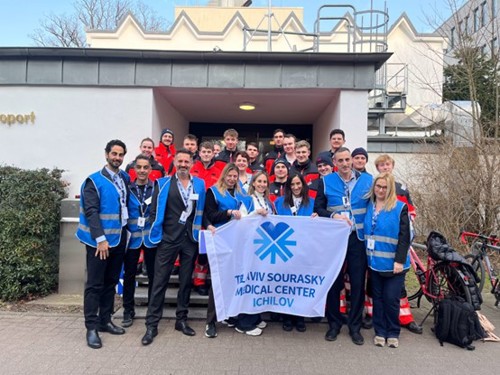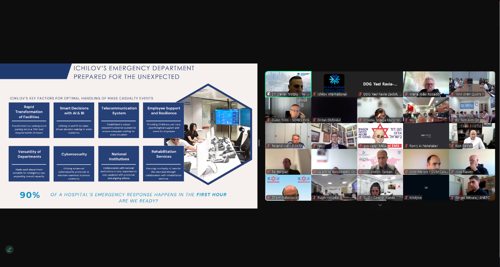Emergency Preparedness at Ichilov
Why Emergency Preparedness Matters
Global Crises Demand Local Readiness
From wars and terror attacks to natural disasters and pandemics, healthcare systems today face unprecedented threats. At Ichilov, emergency preparedness is not just a plan, it’s a daily practice grounded in real-life experience. As Israel’s largest academic hospital, located in the heart of Tel Aviv, we operate under the constant understanding that healthcare must remain uninterrupted, even under missile fire, cyber threats, or mass casualty incidents.

A Hospital Designed for Resilience
Built for Crisis. Proven in Action.
Tel Aviv Sourasky Medical Center (Ichilov) is Israel’s leading academic hospital and one of the largest in the region, with over 1,500 inpatient beds, 1,800+ physicians, and 2,000+ nurses. Each year, we care for more than 2 million outpatients, and handle over 240,000 emergency visits, making Ichilov one of the busiest hospitals in the world.
As an urban medical center located in the heart of Tel Aviv, Ichilov is home to one of the largest emergency departments globally—spanning 8,000 square meters. Our teams have decades of real-life experience managing mass casualty events (MCEs), war-related trauma, and complex civil emergencies
What makes Ichilov unique is its ability to maintain full medical functionality during national crises. Beneath our surface-level facilities lies a 800-bed underground hospital fully equipped to operate independently with intensive care units, emergency surgical suites, radiology, dialysis stations, and logistics systems.
Our protected infrastructure was developed in close coordination with Israel’s Ministry of Health and Home Front Command. Our integrated Hospital-to-Underground (H-to-U) protocol enables full relocation of critical services within 7 hours, and scalable care models help us reduce non-urgent load without compromising urgent and lifesaving services.
Our Emergency Command Center, built into a fortified zone, serves as the hospital’s real-time control tower connecting clinical leadership with national agencies, military partners, and emergency services. AI tools and surveillance systems help us monitor patient flow, optimize triage, and make swift, informed decisions under pressure.
During Crisis We maintain:
- Operational continuity for all critical services: radiology, dialysis, ORs, blood bank, and more
- A 24/7 real-time Emergency Command & Control Center
- Seamless communication with national emergency agencies (MOH, IDF, MDA)
These systems are supported by continuous emergency drills and scenario-based simulation training for our clinical and logistics teams including :
- Mass casualty events (MCEs) : conventional, radiological, biological, toxicological
- Blackout and cyber-attack scenarios
More Sections
Smart Systems. Faster Decisions. Stronger Outcomes.
At Ichilov, innovation is embedded in our emergency preparedness strategy. We combine frontline clinical excellence with advanced technologies to respond faster, triage smarter, and coordinate seamlessly in high-pressure scenarios.
Our emergency systems include:
- AI-driven dashboards for trauma tracking and hospital command
- Real-time decision tools for hospital-wide surge management
- Cybersecure infrastructure built to withstand attacks during national crises
- Telemedicine and remote monitoring capabilities for distributed response
- Integrated communication platforms used jointly with the Ministry of Health, IDF, and EMS
Ichilov also works closely with Israeli health-tech startups and innovation partners to pilot and adopt solutions that enhance hospital resilience—from predictive analytics to emergency robotics.
This fusion of medical experience and technological agility enables us to operate under pressure without compromising on quality of care.
Train with the Experts. Transform Your Hospital’s Resilience.
Held in Tel Aviv, the Emergency Management Preparedness Course (EMPC 2025) is Ichilov’s flagship program for hospital executives and national health authorities.
In this 3-day intensive course, participants will gain practical, proven strategies to manage:
- Mass casualty events (MCEs)
- Surge capacity and continuity of care
- Hospital command and control systems
- Critical care under resource constraints
- Staff resilience and psychological support
The course includes hands-on site visits to emergency zones, trauma units, and our underground facility.
Exporting Know-How. Enhancing Global Readiness.
At Ichilov, we recognize that every healthcare system faces unique challenges. That’s why, alongside our flagship Emergency Management Preparedness Course (EMPC), we offer a full suite of advisory and training services tailored to your institution’s specific needs.
We deliver on-site consulting at hospitals and ministries around the world—conducting structured evaluations of emergency protocols, running full-scale simulations and drills, and providing practical, real-time feedback. Each engagement includes a written diagnostic report with concrete recommendations to strengthen hospital preparedness, coordination, and continuity of care.
We also provide clinical training in emergency medicine, led by our senior physicians, focused on trauma care, triage, command-and-control, and workforce deployment in crisis scenarios.
Whether your organization is looking for strategic consulting, scenario-based exercises, or custom training formats—in-person, virtual, or hybrid—our team will work with you to design the right solution.
Led by Experience. Driven by Duty.
Ichilov’s emergency preparedness efforts are led by a multidisciplinary team of physicians, nurses, logisticians, and engineers who have managed Israel’s most critical emergencies.
Their expertise shapes national protocols and guides hospitals in Israel and abroad in building medical resilience under fire.
From Tel Aviv to the World
Following the Iron Swords War and Operation “Am Kelavi,” Ichilov has hosted delegations from over 30 countries, presented in international webinars on mass casualty management, and advised hospital systems across Europe, Asia, and Africa.
Most recently, over 1,300 participants from 80 countries joined our live training on hospital emergency preparedness further proving the growing global demand for our real-world expertise.










